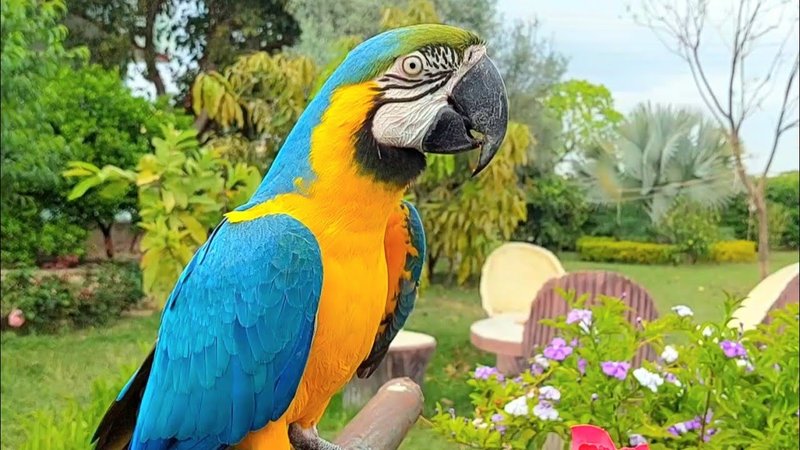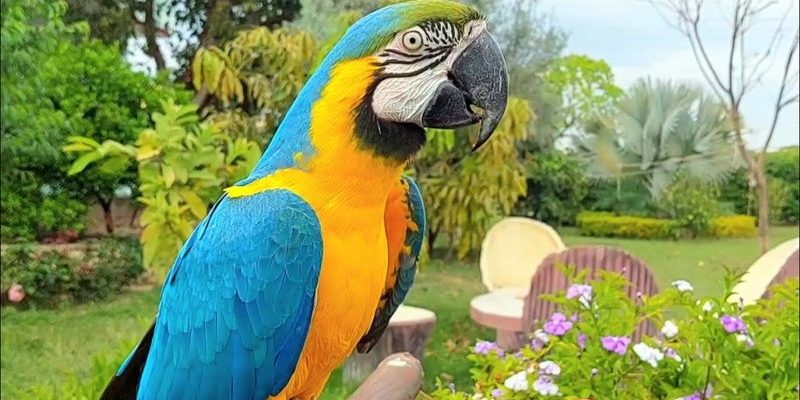
Diving into the world of macaw vocalizations is like stepping into a lively conversation at a bustling café. Each call has its own purpose, much like how we use different tones and words in our daily chats. Whether you’re a seasoned bird enthusiast or just curious about these magnificent parrots, understanding their sounds can deepen your appreciation for their behavior and needs.
In this article, we’ll explore the different types of macaw vocalizations and what they signify. From the cheerful squawks to the heart-wrenching cries, you’ll learn how to interpret what your feathered friend might be saying.
The Common Sounds of Macaws
Macaws are notorious for their loud voices, and every sound they make serves a purpose. Let’s break down some of the most common sounds and what they mean.
Screeching and Squawking
When you hear a macaw screech, it’s almost impossible to ignore. These high-pitched sounds often signal excitement or alertness. Imagine a child shouting with glee while playing; that’s similar to what a macaw might do when it sees something fascinating, like a new toy or a fellow bird.
These vocalizations can also serve as a warning. If a macaw feels threatened, it will often screech to alert its companions. Think of it as a call to arms in the bird world—an urgent reminder to be vigilant.
Contact Calls
Macaws are social creatures, and their contact calls are their way of maintaining connections with their flock. These calls are softer than screeches, often sounding like a series of short whistles or chirps. When a macaw is separated from its companions, it uses these calls to check in, much like we might send a quick text to a friend to see how they’re doing.
It’s fascinating how these calls help them stay unified in the wild. If a macaw is exploring or foraging, it will frequently call out to its flock, ensuring they remain close and safe from potential dangers.
Vocalizations of Distress
Understanding a macaw’s vocalizations can help you respond to their needs effectively. Distress calls are particularly important to recognize.
Whining or Crying
If your macaw is whining or making a soft crying noise, pay attention. This type of vocalization often indicates that something is wrong. Maybe they’re feeling lonely, bored, or a bit under the weather.
Imagine a close friend calling you late at night because they’re feeling down. You wouldn’t ignore that call, right? Similarly, if your macaw starts whining, it’s a signal that they need some comfort or engagement.
Panting Sounds
In some situations, you might hear a macaw panting. This sound isn’t just about vocalization; it can signify stress or discomfort, especially if the bird is over-excited or scared. You can think of it like a person breathing heavily after a workout. If your macaw is panting, it’s essential to evaluate their environment and see if there’s a stressor causing this reaction.
Playful Vocalizations
Macaws love to play, and their vocalizations reflect their joyful spirits.
Chirping and Whistling
A happy macaw often chirps and whistles. These sounds are typically upbeat and playful, signaling that your feathered friend is in a good mood. Think of this as the macaw equivalent of laughter or light-hearted chatter among friends.
When you hear these cheerful sounds, it’s a great sign that your macaw feels comfortable and secure. It often means they’re ready for some interaction, whether it’s playtime or simply some quality bonding moments.
Mimicking Sounds
Macaws are known for their ability to mimic sounds, including human voices or household noises. If your macaw starts imitating the sound of a ringing phone or even a “hello,” it’s their way of engaging with you. It’s like they’re trying to join in on the fun, and this behavior can strengthen the bond between you and your feathery friend.
Mimicking is not just playful; it’s also an expression of their intelligence. Macaws are highly social, and mimicking sounds can help them fit in with their human flock. So, if they start imitating you, consider it a compliment!
Vocalizing for Attention
Attention-seeking vocalizations can be quite common among macaws, especially if they feel they’re not getting enough interaction.
Rapid Repeated Calls
If your macaw starts making rapid-fire calls, it’s likely trying to grab your attention. This could be their way of saying, “Hey, notice me! I need some interaction here!”
Think of it like a child calling for their parent’s attention. If you respond positively, it reinforces their behavior, showing them that vocalizing is a good way to connect with you. Just be mindful not to reinforce negative behavior; instead, redirect their attention with positive engagement.
Learning New Sounds
Sometimes, macaws will develop their own unique sounds to get your attention. These might not be the typical calls you’d expect, and they can vary based on their personality and environment.
If your macaw starts using a sound that’s completely new, it could be their way of communicating a specific feeling or wanting something special. Being attentive to these variations allows you to understand your macaw better and form a closer bond.
How to Interpret Your Macaw’s Vocalizations
Understanding your macaw’s vocalizations can be quite the adventure! The key is to pay attention to context.
Observe Their Body Language
Macaws don’t just vocalize; they also communicate through body language. For instance, a relaxed body posture combined with happy chirps signals cheerfulness, while an agitated stance paired with screeches indicates distress.
By observing both vocalizations and physical cues, you can get a clearer picture of what your macaw is trying to say. They might be squawking loudly, but if their feathers are smooth and their eyes are bright, they might just be excited rather than upset.
Keep a Journal
Consider keeping a journal of your macaw’s vocalizations. Write down what sounds they make and the context in which they occur. Over time, you might notice patterns that help you understand their communication style better.
This practice can also be a fun way to reflect on your journey with your pet, capturing the unique little quirks that make your macaw special.
In the world of macaws, vocalizations are more than just noise; they are a key part of their social interactions and emotional expressions. By tuning into what your macaw is saying, you gain a deeper understanding of their needs and feelings. Whether it’s the joyful chirps of playtime or the urgent calls for attention, each sound tells a story.
So the next time you hear your macaw vocalizing, take a moment to think about what they might be communicating. With a little patience and observation, you can become fluent in the language of your feathered friend, creating a richer bond that goes beyond just companionship.

